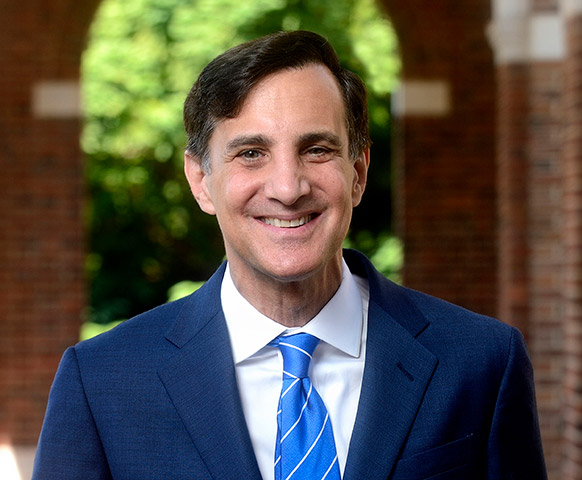
Image caption:
Ronald J. Daniels
President
The principle of academic freedom is no academic exercise.
From Johns Hopkins' founding, this idea has undergirded the freedom of inquiry and expression essential to our enterprise, fueling our greatest discoveries and emboldening our most insightful debates. Daniel Coit Gilman championed it as the sine qua non of America's first research university, and Hopkins philosopher Arthur Lovejoy co-founded the American Association of University Professors, which remains to this day the nation's leading guardian of academic freedom.
In the succeeding years, we have not always walked a clear or easy path on issues of academic freedom.
Indeed, many alumni saw the university grapple with this principle in practice. In the 1950s, hundreds of students, faculty, and staff rallied in Levering Hall to support Owen Lattimore, Hopkins professor and renowned China scholar. Accused by Senator Joseph McCarthy of spying for the Soviet Union, Lattimore was eventually placed on paid leave as he struggled to clear his name. More than a decade later, as the Vietnam War ignited contentious debate, the administration suspended the editors of the News-Letter when they published a satirical article nominating both President Lyndon Johnson and mass-murderer Richard Speck for "Man-of-the-Year." More recently, our community has wrestled with other challenges, ranging from the recognition of student groups to the invitation of commencement speakers, and from the use of social media to the protection of academic freedom ideals on our Nanjing campus.
Given our history, it is striking that Johns Hopkins has never had a formal statement of principles on academic freedom, one that would capture our core commitment to this principle and serve as a touchstone to guide us in the decades to come. With this in mind last year, Provost Rob Lieberman and I charged a task force of faculty and students with creating a statement. Over the ensuing months, they deliberated extensively and submitted to us their recommended draft. We shared their recommendation broadly with our community, incorporating further feedback into a final version. I hope you'll read the final statement in full here.
It is fitting that the announcement of this milestone comes as we welcome a new class of Hopkins students to Homewood. In their intellectual exploration, dynamic debate, and pathbreaking discovery, they will exercise to the fullest the values that academic freedom protects, as our university renews its dedication to holding aloft the lantern of free expression. As the statement reminds us, "Each of us, in our time as members of this community of scholars, bears a responsibility for nurturing its flame, and passing it on to those who will follow."

Ronald J. Daniels
President







